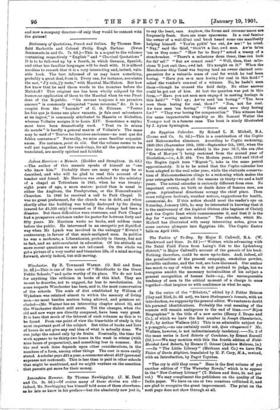Dictionary of Quotations, French and Italian. By Thomas Ben- field
Harbottle and Colonel Philip Hugh Dalbiac. (Swan Sonnenschein and Co. 7s. 6d.)—This is a sequel to the volumes containing respectively " English " and "Classical Quotations" It is to be followed up by a fourth, in which German, Spanish, and other less familiar languages will be dealt with. It is altuost needless to remark that it is a very interesting and, indeed, valu- able book. The best informed of us may learn something, probably a great deal, from it. Every one, for instance, associates the mot, "J'y suis, j'y reste," with Marshal ililacMahon. But how few knew that he said these words in the trenches before the Malakoff ? This original use has been wholly eclipsed by the humorous application of them to the Marshal when he was Presi- dent of the Republic. "On revient toujours a ses premiers amours" is commonly misquoted " nous revenons," &c. It is a couplet from the " Ioconde " of C. G. Etienne. " Toutes les foie que je donne une place vacante, je fais cent m4contents et nn ingrat," is commonly attributed to Mazarin or Richelieu, whereas Voltaire assigns it to Louis XIV. Sometimes a saying must have been dramatically used. "Tout va le mieux du monde" is hardly a general maxim of Voltaire's. The same may be said of" Toutes les bistoires anciennes—ne sont quo des fables convenues." Naturally, we miss some familiar acquaint- ances. For instance, point de zle. But the volume seems to be well put together, and the renderings, for all the quotations are translated, are mostly spirited and faithful.






































 Previous page
Previous page